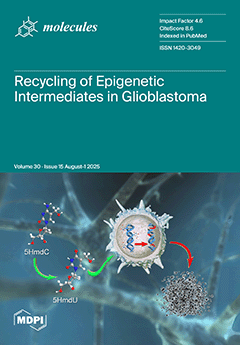In this study, a series of novel
β-phenylalanine derivatives were synthesised and evaluated for their anticancer activity. The 3-(4-methylbenzene-1-sulfonamido)-3-phenylpropanoic acid (
2) was prepared using
β-phenylalanine as a core scaffold. The
β-amino acid derivative
2 was converted to the corresponding hydrazide
4, which enabled the development of structurally diverse heterocyclic derivatives including pyrrole
5, pyrazole
6, thiadiazole
8, oxadiazole
11, triazoles
9 and
12 with Schiff base analogues
13 and series1,2,4-triazolo [3,4-
b][1,3,4]thiadiazines
14. These modifications were designed to enhance chemical stability, solubility, and biological activity. All compounds were initially screened for cytotoxicity against the A549 human lung adenocarcinoma cell line, identifying
N-[3-(3,5-dimethyl-1
H-pyrazol-1-yl)-3-oxo-1-phenylpropyl]-4-methylbenzenesulfonamide (
5) and (
E)-
N-{2-[4-[(4-chlorobenzylidene)amino]-5-thioxo-4,5-dihydro-1
H-1,2,4-triazol-3-yl]-1-phenylethyl}-4-methylbenzenesulfonamide (
13b) as the most active. The two lead candidates were further evaluated in H69 and H69AR small cell lung cancer lines to assess activity in drug-sensitive and multidrug-resistant models. Schiff base
13b containing a 4-chlorophenyl moiety, retained potent antiproliferative activity in both H69 and H69AR cells, comparable to cisplatin, while compound
5 lost efficacy in the resistant phenotype. These findings suggest Schiff base derivative
13b may overcome drug resistance mechanisms, a limitation commonly encountered with standard chemotherapeutics such as doxorubicin. These results demonstrate the potential role of
β-phenylalanine derivatives, azole-containing sulphonamides, as promising scaffolds for the development of novel anticancer agents, particularly in the context of lung cancer and drug-resistant tumours.
Full article






